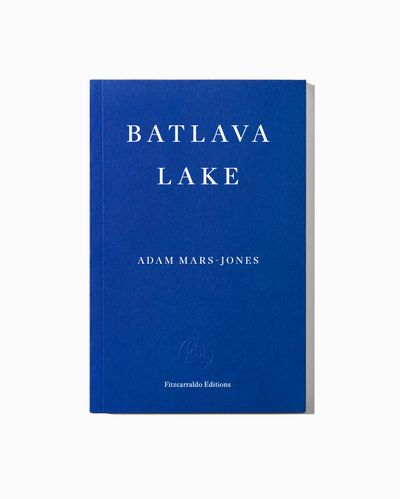Pristina, Kosovo, 1999. Barry Ashton, recently divorced, has been deployed as a civil engineer attached to the Royal Engineers corps in the British Army. In an extraordinary feat of ventriloquism, Adam Mars-Jones constructs a literary story with a thoroughly unliterary narrator, and a narrative that is anything but comic through the medium of a character who, essentially, is. Exploring masculinity, class and identity, Batlava Lake is a brilliant story of men and war by one of Britain’s most accomplished writers.

Batlava Lake
French paperback with flaps, 104 pages
Published 23 June 2021
Batlava Lake
Lake Batlava is beautiful. Deep, not exactly welcoming. I don’t expect the locals think it’s much like Loch Ness, but we did. I did. No legends about monsters, none that I heard of. But how would I get to hear about them anyway? I’d have to speak the language, and the Barry brain doesn’t do languages. Just doesn’t want to know. ‘Gut und Morgen’ is about as much as I can manage in foreign parts, doesn’t get you far in Kosovo. Plus we weren’t there as sightseers, though we saw some sights. We saw some sights.
Batlava Lake isn’t just a beauty spot, civic resource into the bargain. Natural lake but improved. Enhanced. Serves as the main reservoir for a capital city, for Pristina. More than Loch Ness can say for itself, monster or not!
When I first heard the name, like everyone else did, I thought it was the same as the cakey thing. The sticky layers – Greek, is it? Likely Greek. Bit sweet for me, wherever it comes from. Baklava. When I learned the proper name I used it, Batlava, though not everybody did. They stuck with what they knew, came in handy making silly jokes. Jokes about the Baklava Lake being fed by the River Ouzo. And so on – nearly funny. Not quite.
Even if I bust a gut laughing at their jokes wouldn’t make me one of the lads. They were signed-up military and I was only ‘attached’. But still. I had the rank of full colonel, and they were required to salute me. Even if there were no witnesses about, the hand had to go smartly up, recognition of rank. The only snag – my hand had to stay by my side. Couldn’t salute back. Wasn’t allowed to.
Really knocked me off my stride first time it happened. My hand wobbled upwards of its own accord. That’s how it works in films. Never a saluter who doesn’t get saluted. Like when someone throws a ball at you, your hand goes up to catch it even if you weren’t expecting the bloody thing to come your way, isn’t that right? Your body decides and your hand goes up all by itself. How are you supposed to acknowledge a salute when you’re not allowed to return it? You can’t say ‘Much obliged, I’m sure.’ You can’t say ‘Thanks very much mate, appreciate it.’ All you can do is behave as if nothing has happened, grow a shell. Gradually turn into the sort of plonker who expects to be acknowledged without giving anything back.
That first time I called on all my reserves, all my resistance, and went all Barry-be-strong. I sent my hand back down again, though it didn’t feel right to be dropping the ball. As if I was breaking the rules, though in fact, being technical about it, I was obeying them. I noticed something, though, funny thing. There was a look in the ranker’s eyes when I was starting to salute back, by that instinct I’m talking about, not being able to stop myself. You’d have to call it a smirk – at how stupid I was being. If I took the bait and showed respect for him, I was a wally plain and simple. If I played by the rules and behaved as if he wasn’t there then, obviously, I was treating him like shit and I was a shit myself.
So when I managed to stop myself saluting before I was committed to the wally option, there was another look in his eyes. Different, but still pissed off. Pissed off in a new way, giving me a sort of dull glare, resentful glare. I didn’t much like either of the looks that could come my way, to be honest, but there wasn’t a lot I could do about it. I was trapped in the not-saluting side of things, and the lads were trapped in the saluting. None of us happy about it. After a while it seemed to me that when the ranks saluted me, their lips moved, and they mouthed a word, always the same word. I couldn’t say for sure what the word was, but squit would be a strong candidate.
(…)
‘No one inhabits character as intensely and subtly as Mars-Jones. Batlava Lake is therefore completely convincing as an everyman narrative – we know people exactly like Barry Ashton, and may even be exactly like him – but there’s a larger truth here too, about clashes of cultures and history, that make this an important and highly recommended book.’
— Lee Child
‘Barry is a man with no friends and little sense of wonder, who’s better with things than with people, and who can’t see through the detail to what’s really going on…. And when we finally find out what he’s been skirting around, it all fits together precisely, and we look back in wonder at how we got from there to here without being able to see the join. Mars-Jones, it turns out, is an expert engineer himself. And much better at people than poor old Barry.’
— John Self, Observer
‘Mars-Jones is a master of the telling detail … and his increasing use of exclamation marks throughout the book heightens the sense that Barry is living in denial, like Colin in the equally excellent Box Hill, and that we are only hearing one side of the story. It’s an exquisite feat, a complicated character unravelled with simple language: Mars-Jones can do more in a hundred pages than most writers can do in a thousand.’
— Joshua Rees, Buzz Magazine
‘There is something of a tradition of the novella-with-a-dark-twist in British fiction … it isn’t until the very last pages that we can be sure what we’ve just read. But even then, the effect Mars-Jones creates is not that of a twist or revelation but a confirmation of a presentiment for which we’ve been subtly, expertly primed.’
— Nikhil Krishnan, The Telegraph
‘Barry is a clever, funny and anecdotal narrator, and on one level this book is a cracking read. It is also written with a sharp social observation that could easily have made it an exercise in applied snobbery, but Barry is not just the butt of Mars-Jones’s condescension. The overall stance is more like compassion, which makes Batlava Lake a more complex and ultimately rather beautiful book.’
— Phil Baker, The Times
‘Mars-Jones’s considerable strength as a storyteller lies in his ability to inhabit the inner lives of his characters so intimately…. In Batlava Lake, the fictional nature of his writing is underlined by subtle turns and curious narrative omissions, casting a shadow on Barry’s reliability as a narrator…. Mars-Jones manages to do an exceptional job of conveying the horrors of war for such a short novel, using its brevity to the story’s advantage while drawing an inconspicuous but hard-hitting portrait of political collapse.’
— Zehra Kazmi, The Arts Desk
‘As a dark satire of 1990s liberal interventionism and the blithe ignorance that in reality underlay many peacekeeping missions, Batlava Lake is a suitably coruscating and intricately constructed piece of work.’
— Lucian Robinson, Times Literary Supplement
‘Batlava Lake is a sophisticated performance in which it can be difficult to determine where Mars-Jones himself is…. A comedy about an Englishman abroad as well as a war novel by the back door, Batlava Lake offers an elegiac snapshot of a moment in recent history that feels much longer ago.’
— Anthony Cummins, Literary Review
‘Mars-Jones delivers a wry and offbeat story of a civilian man stationed in Pristina, the capital city of Kosovo, during the Kosovo War…. Mars-Jones’s intensely comical depiction of a thoroughly British state of mind makes this a hoot.’
— Publishers Weekly
‘I’ve known and worked with people like Barry Ashton, people who valiantly attempt to become two-dimensional examples of humanity via a steady application of “rationality”…. It is to Mars-Jones’s credit that he is able to restore Barry’s tragic third-dimension and by so doing highlight Barry’s significant moral failings.’
— The Book Beat
Praise for Box Hill
‘I very much enjoyed Box Hill. It is a characteristic Mars-Jones mixture of the shocking, the endearing, the funny and the sad, with an unforgettable narrator. The sociological detail is as ever acutely entertaining.’
— Margaret Drabble
‘A tender exploration of the love that truly dare not speak its name – that between master and slave. On his eighteenth birthday, Colin literally stumbles upon a strapping biker twice his age, and falls into a long-term relationship characterised by devotion, mystery, and submission. In plain unadorned prose, Mars-Jones shows us the tender, everyday nature of this. Self-deprecating, sad, and wise.’
— Fiona McGregor
‘Box Hill is not a novel for the prudish, but it is a masterclass in authorial control…. Despite its diminutive length, it is rich with detail and complexity, and has plenty to demonstrate Mars-Jones’s well-deserved place on any list of our best.’
— Alex Nurnberg, Sunday Times
‘An exquisitely discomfiting tale of a submissive same-sex relationship … perfectly realized.’
— Anthony Cummins, Observer
Adam Mars-Jones’ first collection of stories, Lantern Lecture, won a Somerset Maugham Award in 1982, and he appeared on Granta’s Best of Young British Novelists lists in 1983 and 1993. His debut novel, The Waters of Thirst, was published in 1993 by Faber & Faber. It was followed by Pilcrow (2008), Cedilla (2011) and Caret (2023), which form the first three parts of a semi-infinite novel series. His essay Noriko Smiling (Notting Hill Editions, 2011) is a book-length study of a classic of Japanese cinema, Yasujiro Ozu’s Late Spring. His memoir Kid Gloves was published by Particular Books in 2015. He writes book reviews for the LRB and film reviews for the TLS. He has published two novels with Fitzcarraldo Editions, Box Hill and Batlava Lake.




